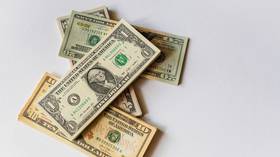Dumping dollars: Russia ditches over a billion bucks of US government bonds as Moscow continues policy of diversifying investments

Russia’s policy of de-dollarization is showing no signs of slowing down, with new figures from the US Treasury revealing that Moscow dropped its holding of US government securities by over a billion dollars from February to March.
In February last year, the Bank of Russia held $5.756 billion, which dropped to just $3.976 billion a month later. Yet only a decade ago, the amount of US government bonds on Moscow’s balance sheet exceeded $170 billion.
The sell-off began in 2014, following the imposition of harsh anti-Russian sanctions by Washington, but Moscow started to become really serious about de-dollarization in 2018, when it more than halved its US government bonds portfolio and used the money to buy gold, as well as euros and yuan.
Since that time, Russia has continued to focus on relying less on the world’s most popular reserve currency. Last year, it was revealed that the first quarter of 2020 saw the share of the dollar in trade between Beijing and Moscow fall below 50% for the first time. Just four years prior, this figure accounted for over 90% of their bilateral currency settlements.
In February, Moscow changed the structure of its national wealth fund, adding yuan and yen, and by dropping the share of dollars and euros to just 35% each. The fund also holds British pounds.
That same month, Deputy Foreign Minister Sergey Ryabkov told the Bloomberg business news network the greenback was “poisonous,” and Russia would be best served by reducing dependence on the US currency.
“We need to barricade ourselves against the US financial and economic system to eliminate dependence on this toxic source of permanent hostile actions,” he said. “We need to cut back the role of the dollar in any operations.”
If you like this story, share it with a friend!













